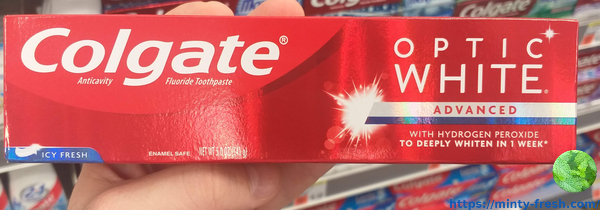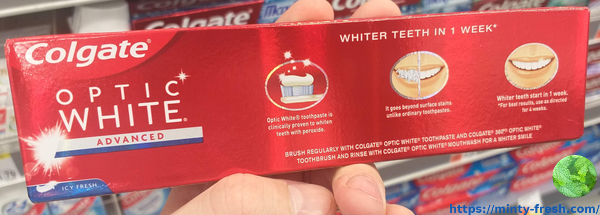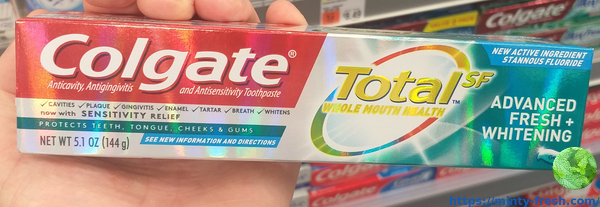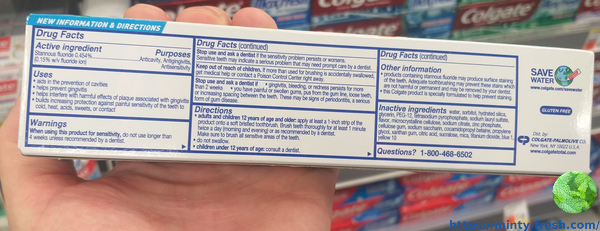COLGATE TOOTHPASTE INGREDIENTS
If you have found this page it is probably because you want to find out what the Colgate toothpaste ingredients are. Well, you have come to the right place but the answer you are looking for is a little more complicated than just one simple list of ingredients. There are 44 different types of toothpaste made by Colgate. We are only going to list a few of them here. If you want to find them all you can see the entire list on the company’s website <a href=http://www.colgate.com/en/us/oc/products/toothpaste">HERE</a>.
Colgate: Cavity Protection - ingredients:
[Click to Enlarge]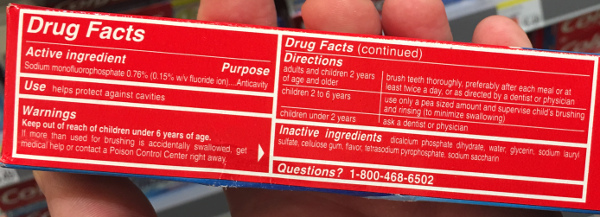
Colgate: Max Fresh - ingredients:
[Click to Enlarge]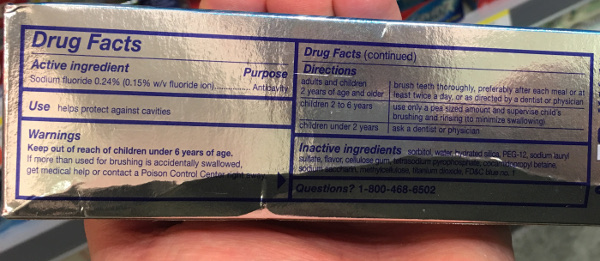
Colgate Toothpaste Ingredients: Example Listings
We have picked a couple of examples ourselves to list the ingredients. We aren’t just listing out the ingredients but we are providing details about what each ingredient is and what it does. A simple list of ingredients wouldn’t be anything special since these aren’t exactly a secret. We provide background information and display a variety of opinions on each specific ingredient’s merits.
We started out with the Colgate Total line of toothpaste and decided to compare the ingredients in two different varieties of this. Each of these had the exact same ingredients listed, just in a slightly different order. They are supposed to be different and maybe they are. I can’t tell what the difference is though myself. Maybe you can tell be searching their site a little more carefully. For Colgate Total, I checked these two products: “Advanced Deep Clean Toothpaste” and “Advanced Whitening Toothpaste”. Here are the ingredients:
Colgate Toothpaste Ingredients List
- Sodium Fluoride
- Triclosan
- Hydrated Silica
- Water
- Glycerin
- Sorbitol
- PVM/MA Copolymer
- Sodium Lauryl Sulfate
- Cellulose Gum
- Flavor
- Sodium Hydroxide
- Carrageenan
- Propylene Glycol
- Sodium Saccharin
- Titanium Dioxide
So after this we decided to try a completely different line of Colgate toothpaste. We went with Colgate Max Fresh Shockwave. Some of the ingredients were different but many of them were completely different. They both contained standard stuff like sodium lauryl sulfate and cellulose gum. This variety looks to be more of a gel type toothpaste and not an actual paste. These are what they have listed as ingredients:
From The Second Colgate Tube:
- Sorbitol
- Water
- Hydrated Silica
- PEG-12
- Sodium Lauryl Sulfate
- Flavor
- Cellulose Gum
- Sodium Saccharin
- Tetrasodium Pyrophosphate
- Cocamidopropyl Betaine
- Lactose Monohydrate
- FD&C blue no.1
Straight From The Tube
We wanted to give you the opportunity to see for yourself what ingredients are included in a tube of colgate toothpaste. We have gone out and taken pictures of actual tubes of toothpaste. These pictures include images of the backs of the boxes showing what ingredients are include. This is the official list provided by the manufacturer. It shows you exactly what you will find in each product. You might be surprised by how much variance there is.
Description of Selected Ingredients
Sodium Fluoride
Great because it helps prevent cavities. It has a few problems though. It isn’t meant to be swallowed. It is toxic and a known carcinogen. It has been said to lower IQ.
Triclosan
This is used as an antibacterial compound. So the big plus of having hits is that it kills germs. It has been shown to have potentially serious effects on health. For example it could effect the thyroid hormone. It is linked to endocrine disruption and skin irritation, among other things.
Hydrated Silica
This ingredient removes plaque. For the most part we haven’t found anything wrong with this ingredient. The worst people could come up with is that it might be thought of as too abrasive but that seems like a stretch.
Water
This ingredient is pretty important. It is also the building block of all life. The biggest danger with water is that of drowning. Water is responsible for more drowning deaths than any other chemical. Colgate Toothpaste doesn’t contain anywhere near that much water so don’t worry too much about this ingredient.
Glycerin
This is a liquid. When it freezes it becomes a gummy paste. It is neutral and colorless. The taste tends to be sweet. In pure chemical form it is called glycerol but in it’s commonly used, impure form, it is called glycerin. Outside of toothpaste it can be used to soften skin. There are not a lot of negative aspects to this substance and it is generally considered safe. It gives toothpaste its’ pasty feel. Some people have claimed that it could be bad for you because it allegedly coats your teeth with a layer that prevents re-mineralization. I’m not completely sold on this idea and I don’t know if it would even be such a bad thing.
Sorbitol
This is a sweetener. It is unnecessary but it does make toothpaste sweeter, if that’s what you’re into. It is a sugar alcohol and it’s flavor is sweet. It is based on corn syrup that has been reduced. It isn’t as sweet as actual sugar and it doesn’t have as many calories either. This isn’t the worst ingredient ever but it is a little bit unsettling to have something like this added to toothpaste. Most of the potentially negative aspects of this are only relevant in foods and drinks that are ingested. Since we don’t eat toothpaste, it is mostly OK.
PVM/MA Copolymer
This ingredient is added to help the triclosan stick to your teeth longer. Basically it is added to assist with the other ingredient, triclosan.
Sodium Lauryl Sulfate
This is added to give texture. It makes the toothpaste soft and foamy. It is added to other products, including everything from hand cream to engine degreaser. It is found in just about everything you could think of. It can cause skin irritation and it could potentially be a carcinogen.
Cellulose Gum
This ingredient is mostly considered safe. It is mainly added for texture. It is derived from cellulose which is just the material that plant cell walls are made of. Usually it is taken from eithe cotton or wood pulp.
Flavor
This could mean just about anything. When an ingredient is listed as ‘flavor’ but isn’t specifically identified, it could literally be any substance that provides a specific change in taste. This is just a free pass to add anything in without really telling anyone.
Sodium Hydroxide
This is just a fancy name for lye. It is a common base chemical. It is used in a huge variety of things including everything from pretzels to Draino. It is highly caustic. The reason this is added to toothpaste is to neutralize the PH of some of the other things that are added. It isn’t good to swallow this. This is another reason that toothpaste is meant to be spit out and not swallowed.
Carrageenan
This is used as a thickening agent. It stabilizes and makes things smoother and more gel like. This is basically just red seaweed extract. Thats it. It is a very natural ingredient.
Propylene Glycol
This is another ingredient that is found in a huge number of different products besides toothpaste. It is added to prevent melting or freezing in extreme temperatures. It is toxic but only in very large amounts. Still thought, don’t swallow it.
Sodium Saccharin
This is yet another flavor enhancer / sweetener. It is 300 times the sweetness of actual, real sugar. There have been studies that have linked it to cancer but these have supposedly been dis-proven. I wouldn’t totally trust it. On the positive side, you don’t swallow toothpaste. So at least for this purpose, it is probably safe. I wouldn’t want it added to any food or drink that I consume though.
Titanium Dioxide
This is used to give toothpaste it’s white color. This way we don’t have to brush with a gross looking grey paste. It can bee seen as a better alternative to using synthetic dyes. It is mostly safe and known to be non-toxic. Some tests have shown that it can lead to cancer when inhaled. It doesn’t seem to be a risk at all when used in this form though.
PEG-12
This is a synthetic, silicone-based polymer. It is basically another ingredient that affects texture, making things smoother. Some have expressed concern over PEG-12 but it is considered generally safe. It is considered mildly hazardous and shouldn’t be used on broken skin. Personally, I wouldn’t swallow it.
Tetrasodium Pyrophosphate
This is used as a tartar control agent. This could be considered toxic but not really that much. It has been compared to table salt and is said to be only twice as toxic as salt ( so not that bad really ). It has been used in everything from marshmallows to chicken nuggets. It is even added to canned tuna.
Cocamidopropyl Betaine
This is derived from coconut oil. It is a foam booster and also has antiseptic properties. In some cases it can be an irritant. It has been said to cause allergic reactions in some people. This has been shown in some studies to actually just be direct irritation and not really allergic reactions.
Lactose Monohydrate
This is basically milk sugar. It could be a problem if you are lactose intolerant and you eat it. We don’t eat/swallow toothpaste so this shouldn’t be an issue. I’m not sure why this one is added to toothpaste but I’m sure there is a good reason.
FD&C blue no.1
This is just an artificially coloring. It has been banned in some places and approved in others. It has the potential to induce allergic reactions in some instances.
So that’s about it. Many things go into modern Colgate toothpaste and most of them have a good, practical reason to be there. Some of them may raise some concerns and you can now be that much more aware of what these are. You need to decide for yourself what exact toothpaste you want and what is right for you. It isn’t a black and white easily define answer. There are many variables to consider and each one is a trade off. If you are aware of the Colgate toothpaste ingredients and what each of them are, then you are that much further ahead.

